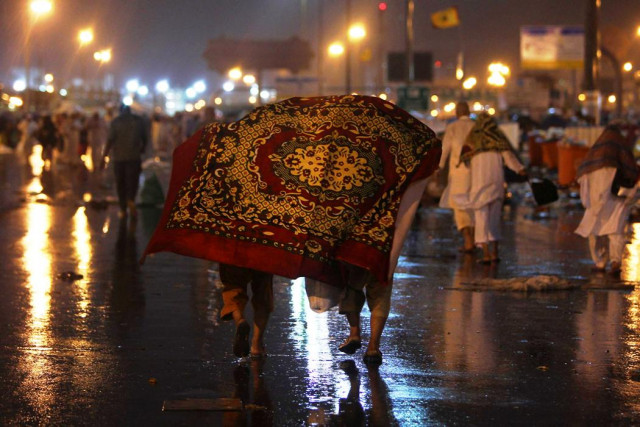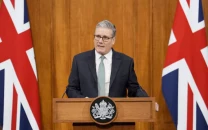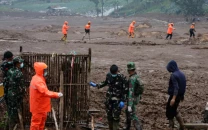Saudi Arabia less rigid with Muslims during hajj
Religious police keep such a low profile during Hajj, it's hard to imagine you are in Islam's holiest city.

The kingdom, where Islam first emerged around 1,400 years ago, applies a strict form of Sunni Islamic Sharia law that imposes gender segregation, forces shops to close during prayer times and prohibits women from driving.
But in Makkah, the enforcement of many of these rules is relaxed during the Hajj, a duty for every able-bodied Muslim. And with the government investing billions of dollars in recent years to make pilgrimage safer and more comfortable, many pilgrims end up going home as goodwill ambassadors for the country.
"We have to thank Saudi Arabia for their services. It's getting better and better every year," said Ritha Naji, a US pilgrim performing a "stoning of the devil" rite that has been the scene of numerous deadly crushes in recent years.
The Grand Mosque, home to the Kaaba shrine which Muslims around the world turn to in prayer every day, is the only place in the desert kingdom where women and men can pray together.
Western diplomats say this tolerance is part of wider efforts to improve the country's image over the past decade after the September 11, 2001 attacks on New York and Washington in which Saudis were involved.
King Abdullah has tried hard to dispel the association between Saudi Arabia and militancy, promoting an international "interfaith dialogue" through the United Nations.
This year's Hajj, which ended this week, drew a record 1.8 million foreigners from diverse regions of the world like Nigeria, Russia and Indonesia that apply a less strict form of Islam than Saudi Arabia.
The US ally often comes under fire from human rights groups criticizing its public beheadings and lack of political freedoms in what is an absolute monarchy.
On Wednesday, Amnesty International called on Riyadh to improve the situation of expatriates after an Indonesian maid was reportedly mistreated by her employer.
But during Hajj Egyptians, Indians or Pakistanis, who make up the bulk of millions of expatriates in the country, receive markedly kinder treatment from Saudi officials who refer to pilgrims as "guests of the Merciful," meaning God.
Polite policemen guide pilgrims around the vast Grand Mosque, while the religious police turn a blind eye to pilgrims taking the kinds of photographs that they had frowned on in previous years.
In the capital Riyadh religious police scour the streets to keep unrelated men and women apart, but in Makkah the sexes mix easily in shops and restaurants. Some eat side-by-side on the ground in front of the Grand Mosque, an impossible sight elsewhere in the kingdom.
Saudi Arabia's minority Shiites often complain of discrimination and attacks by clerics, yet during Hajj Iranian, Iraqi and other Shiites perform the rites unhindered.
Loudspeakers give instructions to the multitude in many languages, including English and Farsi, as well as Arabic.
Safe Hajj key to Saudi prestige
As pilgrim numbers shot up over the past three decades, staging a safe Hajj became crucial for the image of a monarchy that styles its king Custodian of the Two Holy Sites, a reference to the sacred precincts in Makkah and in Madina where the Prophet Muhammad (PBUH) set up the first Muslim administration.
A series of disasters have claimed hundreds of lives during Hajj since 1990, including fires, stampedes, hotel collapses and clashes between police and pilgrims staging political protests.
This year the government unveiled a Hajj train linking the holy sites in and around Makkah that cost $1.8 billion to build. It will only be used some six days a year.
"We want to give pilgrims the best possible level of services," Interior Minister Prince Nayef bin Abdulaziz told reporters last week.
Thanks to its oil wealth, Saudi Arabia can afford to waive the fees for the services it provides, including drinking water, toilet facilities, medical and security services, as well as maintenance and expansion of the Grand Mosque itself.
Cold water is on tap at every corner and medics turn up within minutes when someone collapses. Saudi firms distribute umbrellas as protection from the sun.
The plain of Arafat, where pilgrims spend a whole day according to the rites, has a vast sprinkler system covering an area of some 1.3 square kilometers (0.5 square miles).
"The Saudi services for pilgrims are really good. One has to say that," said Mohammed Idam, a Yemeni cooling under the spray in the afternoon heat at Arafat.
The efforts pay off in the positive message many pilgrims take home with them.
"Our Saudi brothers have expanded many services," said Moroccan pilgrim Mohammed Hamdush.
"Now they've built a train for pilgrims, which is nice."



















COMMENTS
Comments are moderated and generally will be posted if they are on-topic and not abusive.
For more information, please see our Comments FAQ